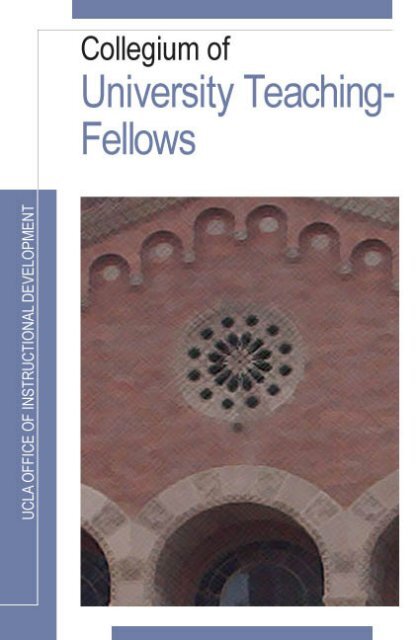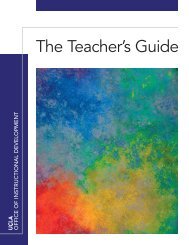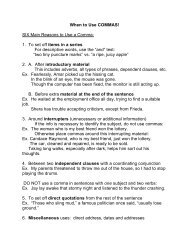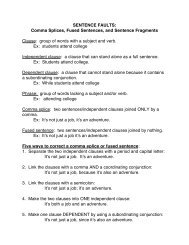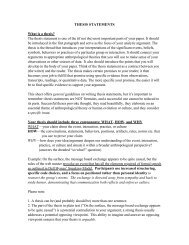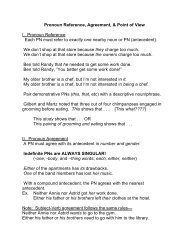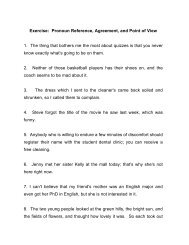Download a PDF of the CUTF Booklet - Office of Instructional ...
Download a PDF of the CUTF Booklet - Office of Instructional ...
Download a PDF of the CUTF Booklet - Office of Instructional ...
You also want an ePaper? Increase the reach of your titles
YUMPU automatically turns print PDFs into web optimized ePapers that Google loves.
The Collegium <strong>of</strong> University Teaching Fellows (<strong>CUTF</strong>) <strong>of</strong>fers outstanding graduate students<br />
<strong>the</strong> opportunity to teach undergraduate, general education seminars on topics related to <strong>the</strong>ir<br />
dissertation research. Since its inception in 1994 as an experimental program sponsored by<br />
<strong>the</strong> Faculty Committee on <strong>Instructional</strong> Improvement Programs, <strong>the</strong> <strong>CUTF</strong> has funded 13-15<br />
undergraduate seminars each year. The popularity <strong>of</strong> <strong>the</strong> program has enhanced <strong>the</strong> competitiveness<br />
<strong>of</strong> <strong>the</strong> selection process and thus <strong>the</strong> prestige <strong>of</strong> having a seminar selected. It has<br />
become increasingly difficult to choose from among <strong>the</strong> approximately 35 departmentally prescreened<br />
proposals submitted to <strong>the</strong> Faculty Advisory Committee each year. Applications are<br />
welcome from students in all UCLA graduate programs. The only requirement is that students<br />
be advanced to candidacy before <strong>the</strong> start <strong>of</strong> <strong>the</strong> fall quarter in <strong>the</strong> year that <strong>the</strong>y teach.<br />
The <strong>CUTF</strong> <strong>of</strong>fers unique opportunities to both graduate and undergraduate students. Graduate<br />
instructors may <strong>of</strong>fer courses on topics close to <strong>the</strong>ir research interests and assume <strong>the</strong><br />
class management responsibilities that are commensurate with those that <strong>the</strong>y will face as new<br />
assistant pr<strong>of</strong>essors. Moreover, <strong>the</strong> <strong>CUTF</strong> prepares <strong>the</strong>m for <strong>the</strong>ir classes through a required<br />
training seminar taught by Pr<strong>of</strong>essor Peter Kollock from UCLA’s Department <strong>of</strong> Sociology and<br />
<strong>the</strong> <strong>Office</strong> <strong>of</strong> <strong>Instructional</strong> Development’s Associate Director, Dr. Kumiko Haas. This seminar,<br />
given in <strong>the</strong> Fall quarter preceding <strong>the</strong> undergraduate <strong>of</strong>ferings, brings fellows toge<strong>the</strong>r as<br />
teaching colleagues to discuss syllabus preparation and classroom strategies. The combination<br />
<strong>of</strong> <strong>the</strong> training and <strong>the</strong> undergraduate seminars provide an invaluable experience for <strong>the</strong> soonto-be<br />
university instructor.<br />
The <strong>CUTF</strong> <strong>of</strong>fers undergraduates stimulating and interesting seminars that significantly broaden<br />
<strong>the</strong> range <strong>of</strong> topics students may explore in satisfying <strong>the</strong>ir general education requirements.<br />
Also, <strong>the</strong> students are exposed to young graduate researchers as teachers who can communicate<br />
<strong>the</strong> excitement and <strong>the</strong> challenges <strong>of</strong> intellectual exploration. Student evaluations <strong>of</strong> <strong>the</strong><br />
seminars have been consistently high, and <strong>the</strong> courses continue to be fully subscribed.<br />
Some <strong>of</strong> <strong>the</strong> most gratifying responses from former fellows have expressed <strong>the</strong> importance <strong>of</strong><br />
<strong>the</strong>ir Collegium experience both in <strong>the</strong>ir job searches and <strong>the</strong>ir first years <strong>of</strong> university teaching.<br />
The collective hope <strong>of</strong> <strong>the</strong> <strong>CUTF</strong> Advisory Committee is that soon a larger number <strong>of</strong> well-qualified<br />
graduate students will be able to benefit from <strong>the</strong> program and thus add an even greater<br />
variety <strong>of</strong> graduate-taught seminars to <strong>the</strong> general education curriculum.<br />
Sincerely,<br />
Pr<strong>of</strong>essor Kathleen L. Komar<br />
Chair, Faculty Advisory Committee<br />
Collegium <strong>of</strong> University Teaching Fellows<br />
Department <strong>of</strong> Comparative Literature
Collegium <strong>of</strong> University<br />
Teaching Fellows<br />
2<br />
The opportunity to develop and lead a lower division seminar through <strong>the</strong> <strong>CUTF</strong> program serves<br />
as a “capstone” to <strong>the</strong> teaching apprenticeship experience <strong>of</strong> select graduate students in departments<br />
across <strong>the</strong> UCLA campus. The Collegium provides teaching fellows with enhanced training<br />
as <strong>the</strong>y prepare for <strong>the</strong> academic job market and <strong>the</strong>ir role as future faculty. Participation in<br />
<strong>the</strong> Collegium is open to advanced graduate students in all divisions <strong>of</strong> <strong>the</strong> College <strong>of</strong> Letters &<br />
Science and throughout <strong>the</strong> pr<strong>of</strong>essional schools, with special consideration given to programs<br />
whose graduate students do not normally have <strong>the</strong> opportunity to teach <strong>the</strong>ir own course.<br />
The <strong>CUTF</strong> Faculty Advisory Committee’s review <strong>of</strong> course proposals ensures that seminars are<br />
<strong>of</strong> a particularly high quality. Specific qualities <strong>of</strong> a fellow’s course proposal such as intellectual<br />
content, originality, and likely student interest are taken into account, as well as ranking by department<br />
chairs, during <strong>the</strong> selection process. The Advisory Committee’s criteria for reviewing<br />
course proposals also suggests that <strong>the</strong> seminar be relevant to <strong>the</strong> graduate student’s career<br />
plans and that it provide a link to <strong>the</strong> subject area <strong>of</strong> <strong>the</strong>ir dissertation research.<br />
Pr<strong>of</strong>essor Peter Kollock, a UCLA Distinguished Teaching Award winner and <strong>the</strong> former Chair <strong>of</strong><br />
<strong>the</strong> Academic Senate Committee on Teaching, and OID’s Associate Director Dr. Kumiko Haas<br />
lead an interdisciplinary 596 seminar, based on <strong>the</strong> TA Training Program model, for all <strong>CUTF</strong><br />
participants. This training seminar helps <strong>CUTF</strong> instructors to fur<strong>the</strong>r refine <strong>the</strong>ir course materials<br />
and pedagogical skills prior to <strong>of</strong>fering <strong>the</strong>ir course to students.<br />
Since <strong>the</strong> program’s inception in 1994 through <strong>the</strong> Spring <strong>of</strong> 2007, <strong>CUTF</strong> has sponsored 188<br />
courses ranging in subjects from Art History to Urban Planning, representing 42 departments<br />
and pr<strong>of</strong>essional schools, which span nearly <strong>the</strong> entire UCLA campus. The 2,598 undergraduate<br />
students who have enrolled in <strong>the</strong>se courses to date have benefited immensely from participating<br />
in a program that allows undergraduate students to learn from cutting-edge graduate<br />
student researchers in <strong>the</strong>ir respective fields in an intimate and interactive seminar environment.<br />
The empirical evidence <strong>of</strong> student satisfaction can be found year after year in <strong>the</strong> consistently<br />
high reviews students <strong>the</strong>mselves have given to <strong>CUTF</strong> courses and its instructors as confirmed<br />
by evaluations submitted to <strong>the</strong> Evaluation <strong>of</strong> Instruction Program whose scores average well<br />
above <strong>the</strong> campus-wide mean. <strong>CUTF</strong>’s commitment to maintaining its high standards and<br />
building upon its own success is an unspoken guarantee to future participants <strong>of</strong> <strong>the</strong> program<br />
that a unique, worthwhile and rewarding learning experience awaits <strong>the</strong>m.<br />
The Nature and Benefits <strong>of</strong> Seminar Work<br />
The lower division seminars <strong>of</strong>fered through <strong>the</strong> Collegium <strong>of</strong> University Teaching Fellows are<br />
generally limited to 15 - 18 students. The seminar limitations on enrollment numbers facilitate a
close working relationship between teaching fellow and student, and permit <strong>the</strong> student to take<br />
an active role in <strong>the</strong> learning process. Seminars typically provide a forum for group discussion<br />
<strong>of</strong> assigned readings where students are not only free, but also encouraged to participate in an<br />
active dialogue with <strong>the</strong> instructor and fellow classmates. Fur<strong>the</strong>rmore, <strong>CUTF</strong> seminar students<br />
have <strong>the</strong> opportunity to define, prepare and present a research project <strong>of</strong> <strong>the</strong>ir own with <strong>the</strong><br />
guidance <strong>of</strong> <strong>the</strong> teaching fellow.<br />
These seminars complement <strong>the</strong> important basic tools that lower division students acquire<br />
through <strong>the</strong> completion <strong>of</strong> General Education requirements, and most <strong>of</strong> <strong>the</strong> seminars may be<br />
substituted for a large GE course in a particular General Education area. Additionally, students<br />
taking part in <strong>the</strong> UCLA Honors Program will receive credit towards <strong>the</strong>ir Honors requirements<br />
upon successful completion <strong>of</strong> <strong>the</strong> course.<br />
Enrollment Information<br />
<strong>CUTF</strong> seminars are listed in <strong>the</strong> UCLA Schedule <strong>of</strong> Classes as 98T level courses. Students<br />
will receive five units <strong>of</strong> academic credit for successful completion <strong>of</strong> a seminar unless stated<br />
o<strong>the</strong>rwise.<br />
The procedure for enrolling in a Collegium <strong>of</strong> University Teaching Fellows seminar is <strong>the</strong> same<br />
as enrolling in regular departmental <strong>of</strong>ferings. Students may enroll through UCLA’s electronic<br />
registration and records system, University Records System Access (URSA), during <strong>the</strong> regular<br />
Registration and Enrollment period http://www.ursa.ucla.edu.<br />
Please note: students must have satisfied <strong>the</strong> entry-level writing requirement before enrolling in<br />
<strong>the</strong>se seminars.<br />
3
1994–2007<br />
<strong>CUTF</strong> Courses<br />
4<br />
Anatomy and Cell Biology<br />
Sex Differences in <strong>the</strong> Brain<br />
Elise Davis<br />
Anthropology<br />
Archaeology <strong>of</strong> Latin America: Debating<br />
Cultural Change in <strong>the</strong> Past, Present, and<br />
Future<br />
Samuel Connell<br />
Culture and Aging: An Introduction to Cultural<br />
Gerontology<br />
Brenda Jenike<br />
The Evolution & Economics <strong>of</strong> Cooperation in<br />
Humans & O<strong>the</strong>r Animals<br />
Rebecca Frank<br />
Home and Away: Contemporary Immigrant<br />
Experience in <strong>the</strong> United States<br />
Joseph Sundeen<br />
Improvisation, Language and Interaction<br />
Keith Murphy<br />
Multicultural Entrepreneurships in Global and<br />
Translocal Contexts<br />
Worku Nida<br />
Why did Europeans Conquer <strong>the</strong> World after<br />
1500<br />
Joseph Henrich<br />
Applied Linguistics & TESL<br />
Apes and Language<br />
Rachel Lagun<strong>of</strong>f<br />
Morality, Language and Interaction<br />
Laurie Schick<br />
Architecture and Urban Planning<br />
Activism and <strong>the</strong> City<br />
Moira Kenney<br />
Re-Conceptualizing Global Architecture<br />
Ari Seligmann<br />
Art History<br />
Art & Technology<br />
Joann Byce<br />
From Romantic Ruin to World Heritage<br />
Site, India’s Historical Monuments and <strong>the</strong><br />
Unmaking and Making <strong>of</strong> a Modern Nation<br />
Santhi Kavuri-Bauer<br />
Identity, Diversity and Representation in<br />
American Art in <strong>the</strong> 1980s & 1990s<br />
Rae Agahari<br />
Questioning Conceptual Art<br />
Beth Lauritis<br />
Representations <strong>of</strong> African-Americans in 19th<br />
Century American Art and Imagery<br />
Jo-Ann Morgan<br />
Asian Languages and Cultures<br />
20th Century Diasporic Affiliations from Asia to<br />
<strong>the</strong> U.S.<br />
Hijoo Son<br />
The Collision <strong>of</strong> Technology and Culture in<br />
East Asia<br />
Min Suh Son
Constructing Womanhood in Modern East<br />
Asia: New Women in New Times<br />
Jennifer Jung-Kim<br />
Early 20th Century Korean Poetry<br />
Ann Choi<br />
Voicing and Constructing <strong>the</strong> Feminine:<br />
Gender, Writing and Representation in Modern<br />
Chinese and Asian American Literature<br />
Eileen Cheng<br />
Bioma<strong>the</strong>matics<br />
In Silico Man: Simulation <strong>of</strong> <strong>the</strong> human body in<br />
biomedical research<br />
Robert Rovetti<br />
Chemistry & Biochemistry<br />
Antioxidants and Free Radicals in Biology,<br />
Nutrition & Disease<br />
Jeffrey Schultz<br />
Application <strong>of</strong> Enzymes<br />
Jerome-Ieronymos Zoidakis<br />
The Colors <strong>of</strong> Life: Metals in Health, Disease<br />
and Nutrition<br />
Joy Goto<br />
Symmetry and Science<br />
Dean J. Tantillo<br />
Exploring Hype: Basics and Ethics <strong>of</strong><br />
Nanotechnology<br />
Lisa Wesoloski<br />
Oxygen: A Necessary Evil<br />
Sadaf Sehati<br />
Classics<br />
The Ancient Novel<br />
Kathryn Chew<br />
Death, Dying, and <strong>the</strong> Dead in Ancient Rome<br />
Basil Dufallo<br />
From Hemlock to Human Torches: Martyrs<br />
and Martyrdom in <strong>the</strong> Classical and Early<br />
Christian Worlds<br />
Jessamyn Lewis<br />
Greek Magic and Science<br />
Julie Laskaris<br />
The Roman Gladiator: Spectacular Victim or<br />
Popular Hero<br />
Melissa Schons<br />
The Urban Experience in <strong>the</strong> Ancient Roman<br />
City<br />
Charles McNelis<br />
Community Health Sciences<br />
Refugee Community Health Care<br />
Michele Fives<br />
Communications Studies<br />
Writing <strong>the</strong> President’s Words: A History <strong>of</strong><br />
Modern Presidential Rhetoric, 1960-Present<br />
Marc Lewis<br />
Comparative Literature<br />
American Identity: Anzaldua to Malcolm X<br />
Lisa Palmer<br />
King Arthur in Medieval Literature and Film<br />
Kristen Lee Over<br />
5
6<br />
Orientalism and East Asia<br />
Christopher Bush<br />
Passing for and Passing Through: Narratives<br />
<strong>of</strong> Racial Passing from a Comparative<br />
Perspective<br />
Susan Bausch<br />
The Terror <strong>of</strong> Gentility<br />
Patrick Wen<br />
Design | Media Arts<br />
Genetics and Culture: From Molecular Music<br />
to Transgenic Art<br />
Ruth West<br />
Earth and Space Sciences<br />
Geology & Politics <strong>of</strong> <strong>the</strong> Grand Canyon<br />
Melissa Giovanni<br />
Ecology and Evolutionary Biology<br />
The Biology <strong>of</strong> Introductions and Invasions<br />
John Lambrinos<br />
Emerging Infectious Diseases: A Multi-<br />
Disciplinary Approach<br />
Maria Diuk-Wasser<br />
Marine Mammals: Their Conservation and<br />
Management<br />
Maddalena Bearzi<br />
Restoration Ecology for <strong>the</strong> 21st Century<br />
Sean Anderson<br />
Sex in <strong>the</strong> Sea: The Oddity, Ecology, &<br />
Evolution <strong>of</strong> Marine Invertebrate Life Cycles<br />
Shannon Erickson Lee<br />
Sharks, Skates and Rays, Oh my! Myths and<br />
Truths <strong>of</strong> Elasmobranch Biology<br />
Laura Jordan<br />
Why Be Nice Cooperation and Conflict in <strong>the</strong><br />
Social Lives <strong>of</strong> Animals<br />
Aviva Liebert<br />
Zoos & Zoo Animals in America<br />
Geordie Duckler<br />
Economics<br />
The Economics <strong>of</strong> Auctions<br />
Joonsuk Lee<br />
Environmental Regulation and Economic<br />
Integration<br />
Craig Mitchell<br />
Intellectual Property Wars: The Economics <strong>of</strong><br />
Innovation<br />
Carlos Ponce<br />
Why All <strong>the</strong> Protest: Current Issues in<br />
International Trade<br />
Randall Hall<br />
Education<br />
What We Talk About When We Talk About<br />
School<br />
Elham Kazemi
Urban College Access: Critical Examinations<br />
<strong>of</strong> Policies and Interventions<br />
Erica Yamamura<br />
Shakespeare’s Strangers: Jews, Christians<br />
and Muslims in Renaissance Drama<br />
Holly Crawford Pickett<br />
English<br />
American Culture and <strong>the</strong> Technological<br />
Sublime<br />
Darrin McGraw<br />
Gay and Lesbian History in American<br />
Literature<br />
Norman Jones<br />
Imagining China: Visions <strong>of</strong> Ano<strong>the</strong>r State in<br />
Post-1965 Multiethnic American Literature<br />
Grace I-chun Yeh<br />
The Modern Highway and <strong>the</strong> Image <strong>of</strong> <strong>the</strong><br />
American West<br />
Lars Larson<br />
New York, Literary Modernism and <strong>the</strong> 1920s<br />
Erin Templeton<br />
“Old Mexico” and <strong>the</strong> New West: Modernism,<br />
Revolution, and American Imperialism<br />
Geneva Gano<br />
Reading Pictures, Viewing Words: Text<br />
and Image from <strong>the</strong> Bayeux Tapestry to Art<br />
Spiegelman<br />
Jessica Brantley<br />
Reading and Weeping: American<br />
Sentimentality and <strong>the</strong> Politics <strong>of</strong> Sympathy<br />
Molly Hiro<br />
Ethnomusicology<br />
The Aes<strong>the</strong>tics <strong>of</strong> Improvisation<br />
Angeles Sancho-Velazquez<br />
Country Music in Los Angeles: 1940 to <strong>the</strong><br />
Present - Exploration <strong>of</strong> a Rural Aes<strong>the</strong>tic in<br />
Urban Settings<br />
Amy Corin<br />
From a Whisper to a Scream: Music, Voice,<br />
and Limits <strong>of</strong> Coherence<br />
Amy Frishkey<br />
The Global, The National and The Local in<br />
Music<br />
Sonia Tamar Seeman<br />
Identity, Nationalism and Resistance in African<br />
Music<br />
Jeffrey Callen<br />
Music, HIV/AIDS, and Social Change in Africa<br />
and Beyond<br />
Kathleen Van Buren<br />
Film & Television<br />
The Automobile and Road in Post-WWII<br />
America and American Film Noir<br />
Michael Samojlik<br />
7
8<br />
City Limits: The Exorbitant Urban Experience<br />
in Contemporary Cinema, 1990 to <strong>the</strong> Present<br />
Ka<strong>the</strong>rine Anne Lawrie<br />
Film and Politics: The Hollywood-Washington<br />
Connection<br />
Jennifer Holt<br />
From Aztlan to <strong>the</strong> Cyber Barrio: Visualizing<br />
Chicano Space<br />
Rita Gonzalez<br />
Justice and Contemporary American Film<br />
Theresa Webb<br />
Intelligent Technologies in Contemporary<br />
American Film<br />
Kevin Fisher<br />
The Meaning <strong>of</strong> Race in Contemporary<br />
Television<br />
Daniel Bernardi<br />
Queer Women & Hollywood<br />
Maria San Filippo<br />
Reel Violence: Understanding <strong>the</strong> Social<br />
Meanings <strong>of</strong> Violence in American Film<br />
Bernard Cook<br />
Representations <strong>of</strong> Women <strong>of</strong> Color in<br />
Contemporary Visual Culture<br />
Beretta Smith<br />
Folklore & Mythology<br />
Queer Folklore and Popular Culture<br />
Elizabeth Tarpley Adams<br />
French & Francophone Studies<br />
Autébiographie: Twentieth-Century French<br />
Women’s Autobiography<br />
Leakthina Ollier<br />
Coming <strong>of</strong> Age and Gender Difference in 20 th<br />
Century French Autobiography<br />
Kimberly Carter-Cram<br />
Love in <strong>the</strong> Ancien Regime: Literature, History,<br />
& <strong>the</strong> Politics <strong>of</strong> Gender in France, 1650-1750<br />
Diane Duffrin<br />
Mapping <strong>the</strong> Mo<strong>the</strong>r: A Multicultural Literary<br />
Approach<br />
Alison Rice<br />
Paris 1900: The O<strong>the</strong>r Turn <strong>of</strong> <strong>the</strong> Century<br />
Stacy Meeker<br />
Visualizing Proust<br />
Vera Klekovkina<br />
Geography<br />
Landscapes <strong>of</strong> <strong>the</strong> Sierra Nevada and<br />
Adjacent Regions<br />
Caroline Josie Tepley<br />
Microbes Know No Boundaries: Migration and<br />
Disease in <strong>the</strong> Modern Era<br />
Timothy Clary<br />
Germanic Languages<br />
Beyond Babel: Translating <strong>the</strong> Holocaust at<br />
Century’s End<br />
Zaia Alexander<br />
Beyond Heidi: (Hi)stories <strong>of</strong> Childhood and<br />
Youth in 20 th Century German Literature and<br />
Film<br />
Anne Ro<strong>the</strong>
Sugar and Spice and Everthing Nice: What<br />
Makes a Girl in 1850-1930 Western Europe<br />
Nina Sylvester<br />
Vienna’s Modernism: from Starbucks to Japan<br />
at <strong>the</strong> Turn <strong>of</strong> <strong>the</strong> Century<br />
Susanne Kelley<br />
History<br />
The Catastrophe <strong>of</strong> War: Experience and<br />
Memory - Men, Women and Children<br />
Elizabeth Townsend<br />
A History <strong>of</strong> Health and Healing in Africa<br />
Karen Flint<br />
The History & Significance <strong>of</strong> <strong>the</strong> Two World<br />
Wars<br />
David Douglas Lee<br />
Merchandizing <strong>the</strong> “Good Life:” American<br />
Consumerism in <strong>the</strong> 20 th Century<br />
Lisa Jacobson<br />
Mystic Chords <strong>of</strong> Memory: The U.S. Civil War<br />
in 20th Century Popular Culture<br />
Christopher Bates<br />
Nuclear Transformations: Techno-Science,<br />
Culture & International Politics<br />
Ka<strong>the</strong>rine Nielsen<br />
Socio-Cultural Aspects <strong>of</strong> 20 th Century<br />
Technopoloes in <strong>the</strong> American West: Case<br />
Study <strong>of</strong> <strong>the</strong> Los Alamos, NM Science City<br />
Reynal Guillen<br />
Women and Gender in <strong>the</strong> Middle East<br />
Jasamin Rostam-Kolayi<br />
Islamic Studies<br />
Introduction to Sufism<br />
Edgar Francis IV<br />
Law<br />
American Law & Terrorism<br />
Philip Carter<br />
Anti-Discrimination Law: Congress & <strong>the</strong> U.S.<br />
Supreme Court 1857 to Present<br />
Stephen Haydon<br />
Crime and Punishment in America:<br />
Controversies in Criminal Justice<br />
Johanna Schiavoni<br />
Cyberlaw: The Bill <strong>of</strong> Rights and <strong>the</strong> Internet<br />
Paul Ohm<br />
The Death Penalty in American Courts and<br />
Society<br />
Bjorn Johnson<br />
The Fourth Amendment: Constitutional<br />
Limitations on Policy Activity<br />
Rebekah Heiser<br />
The Fourth Branch: A Look at <strong>the</strong> Evolution,<br />
Role and Legitimacy <strong>of</strong> Administrative<br />
Agencies in American Governance<br />
Robin Traylor<br />
International Law, Human Rights and U.S.<br />
Foreign Policy: The Case <strong>of</strong> Torture<br />
Leslie Padilla<br />
Money, Politics, and Free Speech: The<br />
Challenges <strong>of</strong> Campaign Finance Reform<br />
Grant Davis-Denny<br />
Progressive Social Movements and Free<br />
Speech<br />
Maya Alexandri<br />
9
10<br />
Punishment in America<br />
Blanca Fromm<br />
The Role <strong>of</strong> Lawyers in Social Movements:<br />
Public Interest Advocacy, Community<br />
Organizing and Policy Reform<br />
Andrew Brunsden<br />
The Supreme Court: Policy and Personality<br />
Brian H<strong>of</strong>fstadt<br />
Trans-gressing <strong>the</strong> Law: The Transgender<br />
Challenger to Sex Laws<br />
Danielle Brown<br />
The U.S. Constitution and Race Relations:<br />
Judicial Interpretation and its Consequences<br />
on Public Law and Policy Affecting Race<br />
Kris Song<br />
Linguistics<br />
Language Invention<br />
John Foreman<br />
Nez Perce Folktales in <strong>the</strong> Context <strong>of</strong><br />
Language & Culture<br />
Harold Crook<br />
Ma<strong>the</strong>matics<br />
Chaos and Fractals<br />
William Cowieson<br />
Communications, Codes, & Ciphers<br />
Corran Webster<br />
Computability and Solvability: A Ma<strong>the</strong>matical<br />
Approach<br />
Ka<strong>the</strong>rine St. John<br />
Cover-ups, Controversies, & Conflicts in<br />
Ma<strong>the</strong>matics<br />
Andrew Nevai-Tucker<br />
Graph Theory and Its Applications<br />
Jennifer Beineke<br />
Graph Theory and <strong>the</strong> Making <strong>of</strong> Mathmatics<br />
Anna Draganova<br />
The Ma<strong>the</strong>matics <strong>of</strong> Winning: An Introduction<br />
to Combinatorial Game Theory<br />
Brian Walter<br />
Microbiology & Molecular Genetics<br />
Impending Epidemics and <strong>the</strong> Evolution <strong>of</strong><br />
Infectious Diseases<br />
Karen Hurst<br />
Genetic Engineering into <strong>the</strong> 21 st Century<br />
Brian Neil Zeiler<br />
Music<br />
Tools for Expression: A Survey <strong>of</strong> <strong>the</strong><br />
Interaction <strong>of</strong> Music and Technology<br />
David Kopplin<br />
Music History<br />
Analogues <strong>of</strong> Darkness – The Music <strong>of</strong> Film<br />
Noir<br />
Durrell Bowman<br />
Film Music and “Auteur” Cinema<br />
Ewelina Boczkowska<br />
Gender Politics in Opera: The Musical<br />
Representation <strong>of</strong> Women<br />
Beth Lorenzo<br />
Music and Machines in <strong>the</strong> 1920s<br />
Erica Scheinberg<br />
Music in 20 th Century Los Angeles: Place,<br />
Race, Ethnicity and Identity<br />
Charles Hiroshi Garrett
Music, Machines, and Performance<br />
Maria Cizmic<br />
New York City Punk Rock (1974-1979)<br />
Caroline Polk O’Meara<br />
The Sound <strong>of</strong> Commitment: Music & Culture in<br />
1930s America<br />
Andrew Berish<br />
Soundz <strong>of</strong> <strong>the</strong> Underground: Issues in<br />
Contemporary Electronic Dance Music<br />
Dale Chapman<br />
Near Eastern Languages & Cultures<br />
Private Lives: Daily Life in Ancient Egypt<br />
Kasia Szpakowska<br />
Neuroscience<br />
The History and Politics <strong>of</strong> Neuroscience and<br />
Psychology<br />
Bill Godsil<br />
Philosophy<br />
Doing Philosophy with Socrates<br />
David Ebrey<br />
Morality, Practical Reason, and Individual<br />
Happiness<br />
William FitzPatrick<br />
The Philosophy <strong>of</strong> Space, Time and Motion<br />
Daniel Su<strong>the</strong>rland<br />
Philosophy XX: Imagery & Imagination<br />
Amy Kind<br />
Understanding Emotion<br />
Larry Herzberg<br />
Physics<br />
Physics in <strong>the</strong> Real World<br />
Igor Glozman<br />
Physics in Your Apartment<br />
Anthony Gopal<br />
Policy Studies<br />
History & Policy: A Field Studies Seminar<br />
Christina Gold<br />
Political Science<br />
Economic Crisis and Political Change in<br />
Sou<strong>the</strong>ast Asia: Prospects for Democracy<br />
Kimberly Niles<br />
Ethnicity, Nationalism and International Politics<br />
Rupen Cetinyan<br />
International Migration, Sovereignty, and <strong>the</strong><br />
Nation-State<br />
Alan Kessler<br />
The Rights <strong>of</strong> War and Peace: History and<br />
Theory <strong>of</strong> International Law from European<br />
Conquest to European Union<br />
Theo Christov<br />
Psychology<br />
The Acquisition and Understanding <strong>of</strong><br />
Expertise<br />
Tate Kubose<br />
Applications <strong>of</strong> Cognitive Science to<br />
Developing Multimedia<br />
Merideth Gattis<br />
Child Anxiety Disorders: Research and<br />
Intervention<br />
Jeffrey Wood<br />
11
12<br />
Child Psychopathology and Psycho<strong>the</strong>rapy<br />
Geri Donenberg<br />
Clinical Issues in <strong>the</strong> Psychology <strong>of</strong><br />
Performance<br />
Autumn Braddock<br />
Consciousness and <strong>the</strong> Brain: The<br />
Neuropsychology <strong>of</strong> Awareness<br />
Jonas Kaplan<br />
Emotions and Helping Behavior<br />
Sabrina Pagano<br />
Evolution, Psychology, and Cognitive Science<br />
Earl Williams<br />
Narrative and Chronic Illness<br />
Nicholas Breitborde<br />
Social Contexts <strong>of</strong> Adolescent Development<br />
Elisheva Gross<br />
The Social Psychology <strong>of</strong> Stigma<br />
Kristin Beals<br />
Stereotyping<br />
Stacey Sinclair<br />
Us vs. Them: Negotiating Social Identity in a<br />
Diverse Society<br />
Adam Fingerhut<br />
Slavic Languages & Literatures<br />
20 th Century Women’s Literature in Russia and<br />
<strong>the</strong> West: Comparative Modes <strong>of</strong> Self-Representation<br />
Anindita Banerjee<br />
Anti-Utopian Literature and <strong>the</strong> Crisis <strong>of</strong><br />
Modernity<br />
Lisa Ryoko Wakamiya<br />
Art & Politics Between <strong>the</strong> Wars: The Avant-<br />
Garde and <strong>the</strong> Authoritarian State<br />
Karen McCauley<br />
The Challenge <strong>of</strong> <strong>the</strong> Avant-Garde: Art,<br />
Literature & Politics in Interwar Europe<br />
Holly Raynard<br />
Russia’s Roaring Twenties: Soviet Literature,<br />
Film and Art as European Culture<br />
Nora Ryan<br />
Social Welfare<br />
Contemporary Urban American Indian Mental<br />
Health Issues<br />
Karina Walters<br />
Domestic Violence: Social Policy, Service,<br />
Research, and Social Action<br />
Mieko Yoshihama<br />
Images <strong>of</strong> <strong>the</strong> Poor: Understanding Poverty in<br />
Contemporary American Society<br />
Jennifer Mosley<br />
Sociology<br />
A Cyber-Ethnographic Approach to Online<br />
Communities: Exploring Online Communities<br />
Through an Innovative Methodology<br />
Laura Robinson<br />
Drugs and Society<br />
Ka<strong>the</strong>rine Beckett<br />
Gender, Race, and Sexuality at Work<br />
Kristen Schilt<br />
Nationalism and Ethnicity in <strong>the</strong> Modern World<br />
John Fox<br />
Non-Racialism and Democratization in South<br />
Africa<br />
Alan Emery<br />
The Sociology <strong>of</strong> Reproduction<br />
Susan Markens
Talk <strong>of</strong> <strong>the</strong> Nation: Contemporary U.S.<br />
Politics & Media Processes in Sociological<br />
Perspective<br />
Andrew Roth<br />
Spanish & Portuguese<br />
At <strong>the</strong> Borderlands <strong>of</strong> a Pan-American Boom<br />
Novel: 1960s-1990s<br />
Juanita Heredia<br />
Her Self With & Without Mirrors: Twentieth<br />
Century Hispanic Women’s Selfrepresentation<br />
Jasmina Arsova<br />
13<br />
Statistics<br />
The Dare to Move: Seeing Life Through <strong>the</strong><br />
Eyes <strong>of</strong> Risk<br />
Adam Sugano<br />
Making Sense <strong>of</strong> Lies, Damned Lies and<br />
Statistics<br />
Ka<strong>the</strong>rine Tranbarger
14<br />
Copyright © 2007 Regents <strong>of</strong> <strong>the</strong> University <strong>of</strong> California


